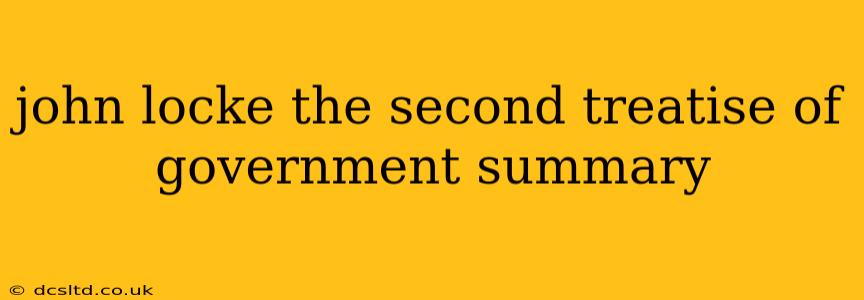John Locke's Second Treatise of Government, published anonymously in 1689, is a cornerstone of liberal political philosophy. It profoundly influenced the development of Western political thought, particularly the American and French Revolutions. This treatise doesn't just summarize existing political theory; it offers a radical reimagining of the relationship between government and the governed, emphasizing individual rights and limited government.
The State of Nature and Natural Rights
Locke begins by exploring the "state of nature," a hypothetical pre-political condition where individuals exist without a governing authority. Crucially, he argues this state isn't a state of war. Instead, it's governed by natural law, which dictates that everyone possesses inherent rights, primarily the right to life, liberty, and property. These rights are not granted by any government; they are inalienable and precede the existence of any political society. The natural law is discoverable through reason, allowing individuals to understand and uphold these rights.
The Social Contract and the Purpose of Government
Locke argues that individuals voluntarily enter into a social contract to form a government. This isn't a contract between individuals and a sovereign ruler, as Hobbes argued, but a contract among individuals to establish a government that protects their natural rights. The purpose of government, therefore, is to safeguard these rights, particularly the right to property. This contrasts sharply with absolutist theories that posit the sovereign's power as unlimited.
What are Locke's main arguments in the Second Treatise of Government?
Locke's primary arguments revolve around:
- Natural Rights: Individuals possess inherent rights to life, liberty, and property that predate government.
- Limited Government: Government's power is limited and derived from the consent of the governed. It's not absolute but subject to constraints.
- Right of Revolution: If a government fails to uphold its end of the social contract by violating the natural rights of its citizens, the people have the right to alter or abolish it.
- Separation of Powers: Although not explicitly detailed as it is later by Montesquieu, the implication of limited government and checks on power suggests a preference for a balanced government structure.
- Property Rights: Locke places significant emphasis on property rights as a fundamental natural right, arguing that individuals have a right to own and control the fruits of their labor.
The Right to Revolution and the Dissolution of Government
Perhaps the most radical aspect of Locke's theory is his articulation of the right of revolution. If the government systematically violates the natural rights of its citizens, thereby breaking the social contract, the people have the right to overthrow it and establish a new government that better protects their rights. This justification for revolution played a significant role in inspiring the American colonists' fight for independence.
What are the key differences between Locke and Hobbes' theories?
Locke and Hobbes, while both social contract theorists, differ significantly in their views:
- State of Nature: Locke viewed the state of nature as governed by reason and natural law, while Hobbes saw it as a "war of all against all."
- Purpose of Government: Locke believed government's primary purpose is to protect individual rights, while Hobbes saw it as maintaining order and security at any cost.
- Sovereignty: Locke advocated for limited government and the right of revolution, whereas Hobbes championed absolute sovereignty.
What is the significance of Locke's concept of property?
Locke's concept of property is central to his political philosophy. He argues that individuals acquire property through their labor, mixing their labor with natural resources to create something new. This right to property is not only essential for individual prosperity but also underpins the stability and prosperity of society as a whole.
How did Locke's ideas influence the American Revolution?
Locke's ideas profoundly influenced the American Revolution. The Declaration of Independence echoes Locke's emphasis on natural rights, the social contract, and the right of revolution. The founding fathers drew heavily on Locke's arguments to justify their rebellion against British rule.
Conclusion
John Locke's Second Treatise of Government remains a vital text in political philosophy. Its emphasis on individual rights, limited government, and the right of revolution continues to shape political discourse and inspire movements for liberty and justice around the world. Its influence extends far beyond its historical context, making it essential reading for anyone interested in understanding the foundations of liberal democracy.
